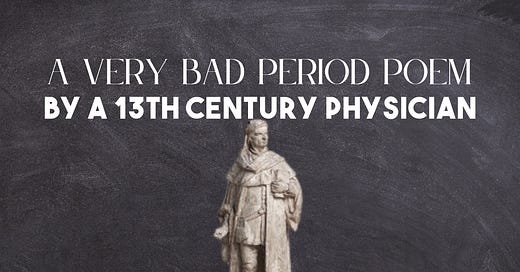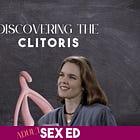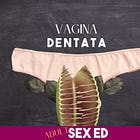Hi horny readers! Thank you so, so much for reading the ADULT SEX ED newsletter.
New here? Adult Sex Ed comedically challenges why we think what we think about sex. I’m Dani Faith Leonard, a filmmaker, comedy writer, and performer. In 2018, I started a comedy show called Adult Sex Ed and launched this newsletter in 2023. Each week, I take a fun deep dive into a topic that I’ve been researching. Ready to plug the holes in your education? Okay, let’s go!
Wow! I got a great response to last week’s newsletter, DISCOVERING THE CLITORIS. Please read it if you haven’t yet. I opened with a personal update and then we took a strange journey through history, as doctors tried to “Christopher Columbus” the clitoris. This week, we have a guest post from my old friend Kate Helen Downey, who also talked about medical misinformation.
Kate is the host of a new podcast about her quest to find out why we know next to nothing about period pain, appropriately titled CRAMPED. Tired of suffering from "death cramps" with no diagnosis for 20 years, Kate Downey has to look for her own answers. She interviews top doctors and researchers, and delves into topics from Greek history to sitcoms to TikTok wellness scams, all to figure out why menstrual pain is so often dismissed and untreated. What she finds will change how you think about your own body and the medical system. Because having a microphone gets you more answers than having a uterus.
Kate introduces us to a problematic 13th Century doctor in the guest article below. Enjoy!
(guest post by Kate Helen Downey)
Women’s bodies are inferior to men’s
They menstruate every month because
They are by nature imperfect beings
-Cecco D’Ascoli, 13th century
One has to assume that sounded better in Italian?
D’Ascoli was a physician, poet, and astrologer, a combo profession that’s now popular again in LA. He really went ahead and said the quiet part out loud, huh?
Even though doctors are not currently writing poems about how women get periods because they suck (THAT I KNOW OF), this attitude has never completely left the medical profession.
Over the last week I’ve been writing the rough draft of an episode about what happens when I go to the ER for my cramps. My experiences at the ER have ranged from unhelpful to traumatic. And I’m not alone - there are numerous studies showing that when seeking help for severe pain, women wait longer for paid medication, are less likely to receive pain medication at all, and when they do, they receive less of it than men for identical symptoms.¹
When research is done into why doctors and nurses are under-treating pain in women, it reveals common beliefs that women are “less sensitive to pain, more tolerant of pain, less distressed as a result of pain, and more likely to report pain and express pain through nonverbal gestures” when compared with men². So doctors and nurses think women can handle more pain than men, and are less upset by that pain then men are, but that they are complaining to their doctor about it more?
But when you look at the research into whether women and men actually experience pain differently, you find the OPPOSITE is true. In clinical tests, women tend to have a lower threshold of pain than men (meaning they identify a stimulus as being painful at a lower level then men do), higher pain ratings than men (meaning they rate the same level of stimulus as being more painful than men do), and a lower pain tolerance than men (meaning they choose to stop the painful stimulus during an experiment sooner than men do)³.
Now, a couple of notes - research on pain is very subjective and difficult to do. People respond differently to pain in a clinical setting than in the real world. Some studies look for sex differences in the experience of pain and don’t find any, but the studies that DO find differences generally find them in the same direction, with women statistically having lower pain thresholds and tolerances, and higher pain ratings. This doesn’t mean women are wimps.
One theory as to why women have lower pain thresholds is that women feel pain as a part of normal biological processes, like menstruation and childbirth, so it may be evolutionarily beneficial to notice any pain earlier, so we can identify whether its pain from a normal process, or pain that needs attention. Men don’t need to do this sorting, so it may be beneficial to be able to ignore that pain longer.
So the research is telling us that women are experiencing more pain than men from the same stimulus, but many doctors and nurses believe that men are actually experiencing more pain, and prioritizing and treating their patients accordingly.
Maybe they don’t know that Cecco d’Ascoli was burned at the stake after he wrote that poem. Although, he was burned at the stake because he read Jesus Christ’s horoscope and that was heresy, not because he was a raging medical misogynist. Everyone was actually fine with that.
Listen to the latest episode of CRAMPED HERE.
Make sure you’re subscribed so you never miss a post!
If you enjoyed this newsletter, please share with friends, so they can be hilariously informed.
Don’t miss these recent newsletters:









Thank you for having me guest post, Dani!!